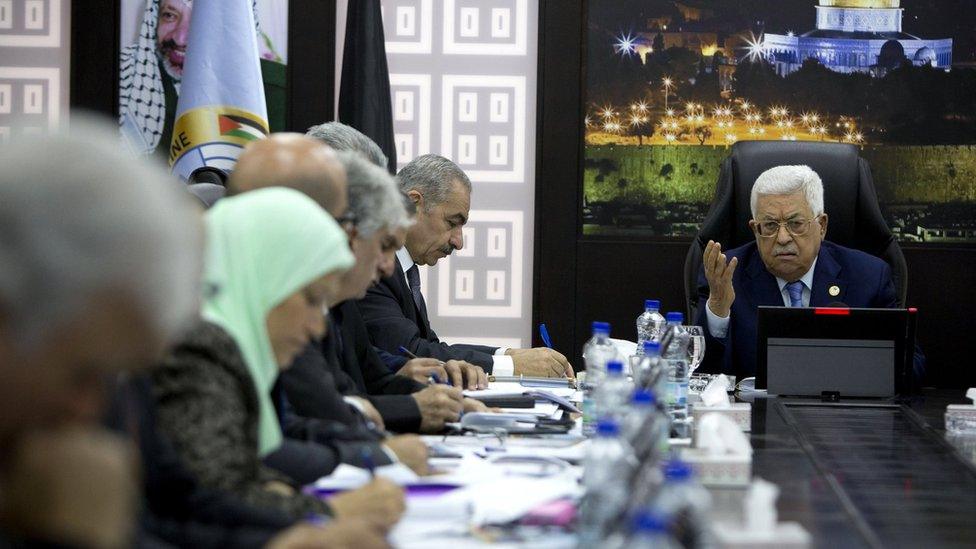Anger at Palestinian ministers' secret 67% pay rises
- Published

Palestinian Authority President Mahmoud Abbas (R) agreed to the raises two years ago
The UN has condemned the cash-strapped Palestinian Authority after it emerged that ministers in the previous cabinet secretly gave themselves 67% pay rises.
Leaked documents showed their monthly salaries were increased in 2017 from $3,000 (£2,360) to $5,000 (£3,930).
UN Middle East peace envoy Nickolay Mladenov said such moves "defy logic and anger people" when Palestinians were struggling with economic hardship.
Prime Minister Mohammad Shtayyeh had agreed to end the practice, he added.
Mr Shtayyeh - an economist who took office in April - has also ordered an investigation, during which ministers will reportedly receive half their salaries.
Allow Twitter content?
This article contains content provided by Twitter. We ask for your permission before anything is loaded, as they may be using cookies and other technologies. You may want to read Twitter’s cookie policy, external and privacy policy, external before accepting. To view this content choose ‘accept and continue’.
In an interview with the New York Times published on Wednesday, Mr Shtayyeh warned that the PA was in such dire financial straits that it was "in a collapsing situation", external and could be bankrupt by July or August.
The financial crisis was exacerbated this February by a dispute with Israel over the transfer of tax and tariff revenues it collects on the PA's behalf.
Israel announced it would freeze the transfer of about $139m (£109m) - an amount it said was equal to that paid by the PA in 2018 to families of Palestinians jailed by Israel or killed while carrying out attacks.
Israeli officials say the payments incentivise terrorism. But the PA insists they are welfare payments for relatives of prisoners and "martyrs".
The PA responded to the freeze by refusing to accept any further Israeli revenue transfers, which account for about half its budget.
In March, the PA said it would have to halve the wages of all but its lowest-earning employees, or the 40% of the workforce that takes home $555 or less a month.
Mr Shtayyeh warned that if the PA experienced a financial collapse it would have to put security personnel in the occupied West Bank on unpaid leave.
The BBC’s Paul Adams went to a camp in Beirut to meet the Palestinian refugees who still can't go home
The prime minister also denounced as "blackmail" US attempts to pressure Palestinian leaders to re-engage ahead of the unveiling of a long-awaited Middle East peace plan.
Since 2018, the US has ended both bilateral aid for Palestinians and contributions for the UN Relief and Works Agency for Palestine Refugees (Unrwa).
Those moves came after the PA cut off diplomatic contacts in response to President Donald Trump's decision to recognise Jerusalem as Israel's capital and move the US embassy to the city from Tel Aviv.
Mr Trump's Special Representative for International Negotiations, Jason Greenblatt, dismissed Mr Shtayyeh's warning, external about the PA's financial situation.
Allow Twitter content?
This article contains content provided by Twitter. We ask for your permission before anything is loaded, as they may be using cookies and other technologies. You may want to read Twitter’s cookie policy, external and privacy policy, external before accepting. To view this content choose ‘accept and continue’.